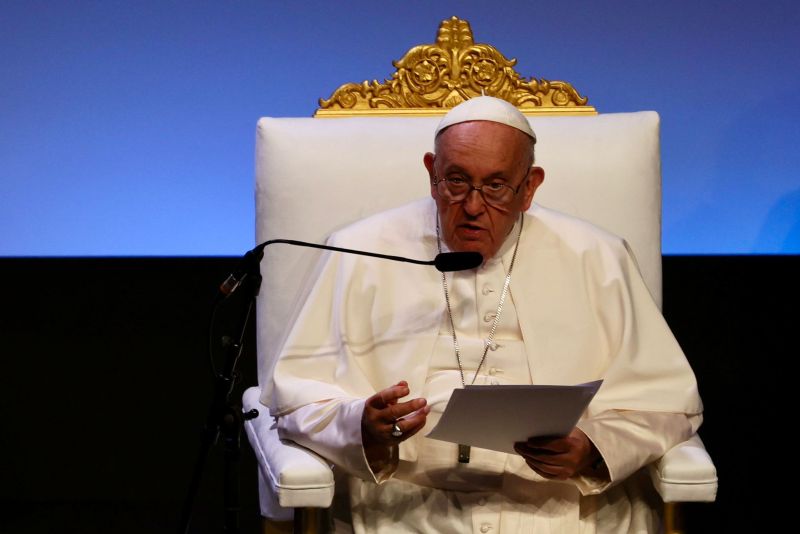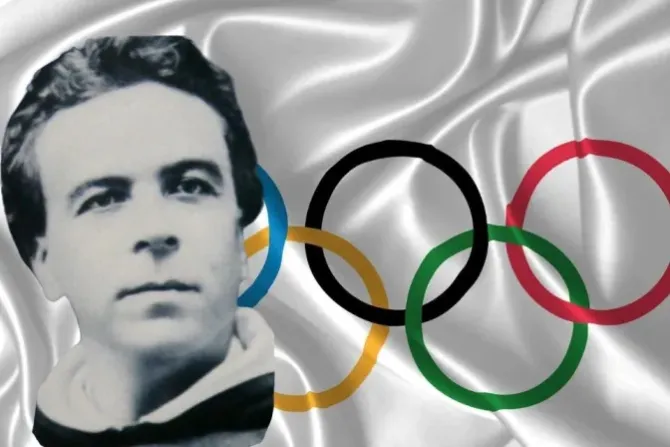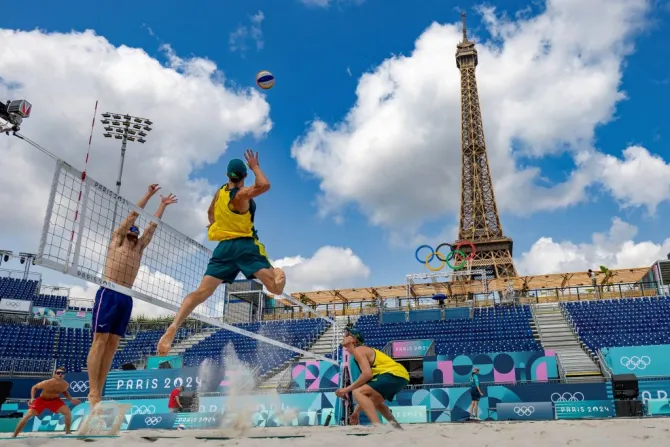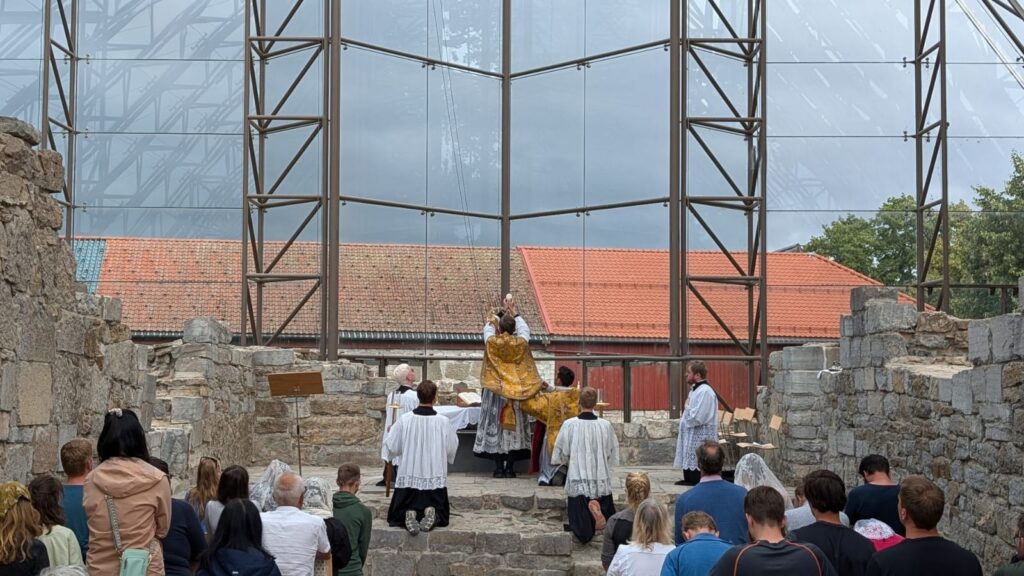CNA Newsroom, Sep 23, 2023 / 08:41 am (CNA).
The deepening migrant crisis unfolding in the Mediterranean is “a reality of our times” that calls for wisdom and a collaborative response from European nations, not “alarmist propaganda,” Pope Francis said Saturday at an interreligious youth conference in Marseille, France.
Speaking at an event called the Mediterranean Encounter, the pope said the “stifled cry of migrant brothers and sisters” is turning the Mediterranean Sea from “the cradle of civilization” to the “graveyard of dignity.” More than 20,000 people have died on Central Mediterranean migration routes since 2014. At least 441 perished in the first three months of this year, the worst quarterly spike since 2017.
The large port of Marseille can’t be closed, the pope said, but other ports have closed to migrants. “And,” he lamented, “there were two words that resounded, fueling people’s fears: ‘invasion’ and ‘emergency.’”
“Yet those who risk their lives at sea do not invade, they look for welcome,” the Holy Father insisted.
“As for the emergency, the phenomenon of migration is not so much a short-term urgency, always good for fueling alarmist propaganda, but a reality of our times, a process that involves three continents around the Mediterranean and that must be governed with wise foresight, including a European response capable of coping with the objective difficulties.”
The need for a pan-European response has been one of the pope’s most repeated pleas. People can’t be left in what he calls the concentration camps of Libya nor allowed to drown in the Mediterranean; but certain countries, particularly Italy, Greece, Cyprus, Malta, and Spain, cannot alone bear the brunt of the burden. He suggested that perhaps a Mediterranean bishops’ conference should be established to facilitate ongoing regional dialogue.
“The ‘mare nostrum’ [our sea] cries out for justice, with its shores that, on the one hand, exude affluence, consumerism, and waste, while on the other there is poverty and instability,” Pope Francis said. “Here also the Mediterranean mirrors the world, with the South turning to the North, with many developing countries, plagued by instability, regimes, wars, and desertification, looking to those that are well-off, in a globalized world in which we are all connected, but one in which the disparities have never been so wide.”
Pope Francis arrived Friday in Marseille, a coastal city in the Provence region of southern France. The main purpose of his visit was to attend the Mediterranean Encounter, a gathering of young people of various creeds with bishops from 30 countries focused on migration issues. The event concludes on Sunday, which is the World Day of Migrants and Refugees.
Earlier on Saturday, the pope attended a private meeting with people experiencing economic hardship at a Missionaries of Charity convent in the city. After his address at the youth conference, he met with French President Emmanuel Macron at the Palais du Pharo, a palace in Marseille built in 1858 by Emperor Napoleon III for Empress Eugénie.
You can watch highlights of the pope’s first day in Marseille in the EWTN video below.
HIGHLIGHTS | After landing in Marseille, France, Pope Francis visited the Basilica of Notre Dame de la Garde. He also met local religious leaders at a memorial dedicated to sailors and migrants lost at sea. #PopeinMarseille pic.twitter.com/1sW1eBsSb8
— EWTN Vatican (@EWTNVatican) September 22, 2023
‘Our sea’ is a ‘place of encounter’
In his conference speech, Pope Francis referred to a legendary love story from the beginnings of the city of Marseille to insist that coexistence between peoples, even if it’s difficult, is above all a source of joy.
“Founded by Greek sailors who came from Asia Minor, legend traces it back to a love story between an emigrant sailor and a native princess,” the pope said, noting that from its very beginnings, Marseille has been a city that “gives a homeland to those who no longer have one.”
There is a long history of conflicts in the Mediterranean as well, the pope acknowledged.
“Let us not ignore the problems,” he said, “yet let us not be misled: The exchanges that have taken place between peoples have made the Mediterranean the cradle of civilization, a sea overflowing with treasures … Our sea — mare nostrum — is a place of encounter: among the Abrahamic religions; among Greek, Latin, and Arabic thought; among science, philosophy, and law; and among many other realities. It has conveyed to the world the lofty value of the human being, endowed with freedom, open to the truth and in need of salvation, who sees the world as a wonder to be discovered and as a garden to be inhabited, under the imprint of a God who makes covenants with men and women.”
Pope Francis speaks at the closing session of the Mediterranean Encounter in Marseille, France, on Sept. 23, 2023. Credit: Vatican Media
The pope reflected that if one looks at the map, his host city “almost seems to draw a smile between Nice and Montpellier. I like to think of it that way, as ‘the smile of the Mediterranean,’” he said, which brought warm applause from his hosts.
Francis compared the Mediterranean to the Sea of Galilee, which at the time of Christ also had “a concentration of various populations, beliefs, and traditions.” It was in that “multifaceted and in many ways unstable context” that Jesus proclaimed the Beatitudes and taught that God is the Father of all.
“Here then is the answer that comes from the Mediterranean: This perennial Sea of Galilee urges us to oppose the divisiveness of conflicts with the ‘coexistence of differences,’” he said.
This sea has a vocation to be a “laboratory of peace.” And this is a vocation sorely needed as “antiquated and belligerent nationalisms want to make the dream of the community of nations fade! Yet — let us remember this — with weapons we make war, not peace, and with greed for power we return to the past rather than building the future.”
For peace to take root, the pope said, we have to begin by listening to the poor, as Jesus did on the banks of the Sea of Galilee. “We need to start again from there, from the often silent cry of the least among us, not from the more fortunate ones who have no need of help yet still raise their voices.”
Flanked by bishops and other Christian leaders, the Holy Father centered his address on human dignity beyond the issue of migration, as he also took the occasion to condemn euthanasia and abortion. France is in the process of considering assisted suicide. Leaving his text, the pope lamented how babies are “confused with puppies” and recounted how a secretary told him about seeing a woman pushing a baby carriage, only to discover that it was a pet inside, not a child.
The poor must be “embraced, not counted,” Pope Francis said, “for they are faces, not numbers.”
“Indeed, the real social evil is not so much the increase of problems but the decrease of care,” the pope said.
“Who nowadays becomes a neighbor to the young people left to themselves, who are easy prey for crime and prostitution? Who is close to people enslaved by work that should make them freer? Who cares for the frightened families, afraid of the future and of bringing children into the world? Who listens to the groaning of our isolated elderly brothers and sisters, who, instead of being appreciated, are pushed aside, under the false pretenses of a supposedly dignified and ‘sweet’ death that is more ‘salty’ than the waters of the sea?
“Who thinks of the unborn children, rejected in the name of a false right to progress, which is instead a retreat into the selfish needs of the individual? Who looks with compassion beyond their own shores to hear the cry of pain rising from North Africa and the Middle East? How many people live immersed in violence and endure situations of injustice and persecution!”
He said this last situation describes the many Christians who are forced to leave their homelands or live without recognition of their rights.
Referring to himself, however, Pope Francis insisted that “this pope who came from the other side of the world is not the first to warn of it with urgency and concern.”
Instead, the Church has made this appeal for 50 years. He cited Pope Paul VI, who said: “The hungry nations of the world cry out to the peoples blessed with abundance. And the Church, cut to the quick by this cry, asks each and every man to hear his brother’s plea and answer it lovingly.” And Pope Pius XII, who said: “the Holy Family in exile, Jesus, Mary, and Joseph emigrating to Egypt … is the model, example and support for all emigrants and pilgrims of every time and country, and of all refugees of whatever condition who, whether compelled by persecution or by want, are forced to leave their native land and beloved parents … and to seek a foreign soil.”
Human dignity must be paramount
Francis cited the “three duties” of the more developed nations listed by Paul VI: “mutual solidarity — the aid that the richer nations must give to developing nations; social justice — the rectification of trade relations between strong and weak nations; universal charity — the effort to build a more human world community, where all can give and receive, and where the progress of some is not bought at the expense of others.”
The Argentinian pope admitted that “welcoming, protecting, promoting, and integrating unexpected persons” is not easy, but he insisted that “safeguarding human dignity” must be the principal criterion, not “the preservation of one’s own well-being.”
“Those who take refuge in our midst should not be viewed as a heavy burden to be borne,” he said. “If we consider them instead as brothers and sisters, they will appear to us above all as gifts.”
Before his audience, he recognized that “history is challenging us to make a leap of conscience in order to prevent a shipwreck of civilization,” adding that the solution is “not to reject but to ensure, according to the possibilities of each, an ample number of legal and regular entrances.”
“We need fraternity as much as we need bread,” the pope insisted. “The very word ‘brother’ in its Indo-European etymology derives from a root associated with nutrition and sustenance. We will support ourselves only by nourishing with hope the most vulnerable, accepting them as brothers and sisters.”
Here, the pope referred to another tradition associated with Marseille: that it was evangelized by Jesus’ friends of Bethany, the siblings Sts. Martha, Mary, and Lazarus.
“As Christians, who believe in God made man, in the one inimitable Man who on the shores of the Mediterranean called himself the way, the truth, and the life, we cannot accept that the paths of encounter should be closed, that the truth of Mammon should prevail over human dignity, that life should turn into death,” he said.
“Worship God and serve the most vulnerable, who are his treasures. Adore God and serve your neighbor, that is what counts: not social importance or vast numbers, but fidelity to the Lord and to humanity!”
Before he departs for Rome on Saturday evening the pope will offer Mass at the Vélodrome Stadium.




